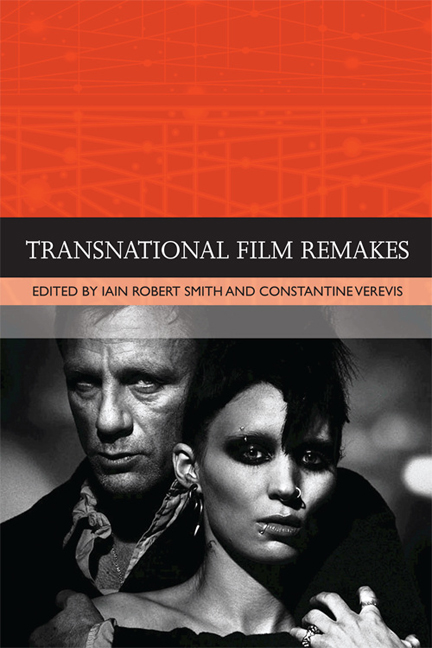Book contents
- Frontmatter
- Contents
- List of Illustrations
- Traditions in World Cinema
- Introduction: Transnational Film Remakes
- PART I GENRES AND TRADITIONS
- PART II GENDER AND PERFORMANCE
- PART III AUTEURS AND CRITICS
- 9 A Tale of Two Balloons: Intercultural Cinema and Transnational Nostalgia in Le voyage du ballon rouge
- 10 ‘Crazed Heat’: Nakahira Ko and the Transnational Self-remake
- 11 Remaking Funny Games: Michael Haneke's Cross-cultural Experiment
- 12 Reinterpreting Revenge: Authorship, Excess and the Critical Reception of Spike Lee's Oldboy
- 13 The Transnational Film Remake in the American Press
- Notes on the Contributors
- Index
13 - The Transnational Film Remake in the American Press
from PART III - AUTEURS AND CRITICS
Published online by Cambridge University Press: 22 December 2017
- Frontmatter
- Contents
- List of Illustrations
- Traditions in World Cinema
- Introduction: Transnational Film Remakes
- PART I GENRES AND TRADITIONS
- PART II GENDER AND PERFORMANCE
- PART III AUTEURS AND CRITICS
- 9 A Tale of Two Balloons: Intercultural Cinema and Transnational Nostalgia in Le voyage du ballon rouge
- 10 ‘Crazed Heat’: Nakahira Ko and the Transnational Self-remake
- 11 Remaking Funny Games: Michael Haneke's Cross-cultural Experiment
- 12 Reinterpreting Revenge: Authorship, Excess and the Critical Reception of Spike Lee's Oldboy
- 13 The Transnational Film Remake in the American Press
- Notes on the Contributors
- Index
Summary
One need not look very hard to find someone denigrating Hollywood remakes of so-called ‘foreign’ films. In addition to a list of examples on a Wikipedia page, a quick Google search for ‘Hollywood remakes of foreign films’ will turn up: an article in Paste magazine entitled ‘10 Great Foreign Films with Horrible U.S. Remakes’ (Ryan 2014), a piece in Flavorwire called ‘10 Terrible Remakes of Great Foreign Films’ (Bailey 2014), and an article on Cheatsheet.com entitled ‘8 Great Foreign Films Remade Into American Movie Failures’ (Arnold 2015). In addition to such clickbait, one can find similar sentiments expressed in any number of film reviews appearing in established print publications. For instance, one critic wrote ‘Most Hollywood remakes of foreign films screw things up by dumbing things down’, in a review of Let Me In (2008), which he praises for being untypical in this regard (Lumenick 2010: 35). Another critic titled his review of Vanilla Sky (2001) ‘Open to Interpretation: Hollywood Versions of Foreign Films Rarely Live Up to the Originals’ (Fine 2001: F16). And lest anyone think this is strictly a contemporary phenomenon, an article from 1936 was entitled ‘Many Films from Europe Remade Here: Hollywood Versions Usually Inferior, Declare Critics’ (Scheuer 1936: C1). The author lists nearly a dozen examples of such remakes, and says of them, ‘Something – charm, lightness, power, what-not – is generally lost in transit’ (Scheuer 1936: C1).
Nothing about this discourse should be surprising, especially to those who have studied transnational film remakes with any seriousness. Indeed, some of the scholarship about transnational remakes has aimed, explicitly or otherwise, to move beyond the evaluative and comparatively simplistic discussions of such films that appear in mainstream film reviews. Lucy Mazdon, for instance, begins her extraordinary study of Hollywood remakes of French films by indicating how film critics in England and France have dismissed film remakes in general, and Hollywood remakes of French films in particular, as commercially driven ‘“pap”’, and promises that her book will provide a richer, adequately complex account of the phenomenon (2000: 2). Likewise, in my essay about Abre los Ojos (1997) and Vanilla Sky I cite a review by critic Kenneth Turan as characteristically dismissive of Hollywood remakes of foreign films.
- Type
- Chapter
- Information
- Transnational Film Remakes , pp. 210 - 223Publisher: Edinburgh University PressPrint publication year: 2017



